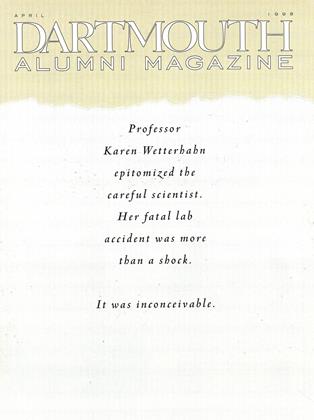When establishing a. national government, the Founding Fathers reserved many traditional rights for the separate states. The Commonwealth of Massachusetts claimed one in 1990 when it enacted the "Burma Law," establishing restrictions on purchasing from people, companies, or nations doing business in Burma, which had been identified by human righte commissions as having violated the rights of its own citizens. Some prominent U.S. companies have since with drawn from Burma. But it is now the job of Thomas Barnico '77, an assistant attorney, general in the Bay State, to respond to the pleas of other companies in the United States. Japan, and Europe for our federal government "to get its unruly provincials in line" before Massachusetts gets the idea of evtending its sanctions to Indonesia. China, or even Northern Ireland. As Barnico recently explained to a responsive audience in Dartmouth's Rockefeller Center, the World Trade Organization could impose retaliatory sanctions on Massachusetts, and the United States could invoke an "undue encroachment on its authority to determine trade relations." On the other band, says Barnico. Massachusetts residents argue that it's their money: thai they can choose not to do business with anyone the they don't like: and as in the early wrangling over divestment in South Africa, the states have First Amendment rights: to speak or act on their own. "The world's troubles are our troubles," Barnico says. Bur he cautions that in the complex realm of American foreign trade policy, speak ing with more than one voice can create extra problems.
Brad Evans '98, Belinda Ng '98, and Stacie Steinberger '98 stand by Barnico during his recent visit to campus.
 View Full Issue
View Full Issue
More From This Issue
-
 Cover Story
Cover StoryThe Trembling Edge Of Science
April 1998 By Karen Endicott -
 Feature
FeatureSpiked Boots and the End of an Era
April 1998 By Edie Clark -
 Feature
FeatureA Change in the Weather
April 1998 -
 Feature
FeatureThe STREAMLINER DINER
April 1998 By Jane Hodges '92 -
 Article
ArticleThe Benefits of a College Town
April 1998 By Jeanhee Kim '90 -
 Class Notes
Class Notes1985
April 1998 By John MacManus







